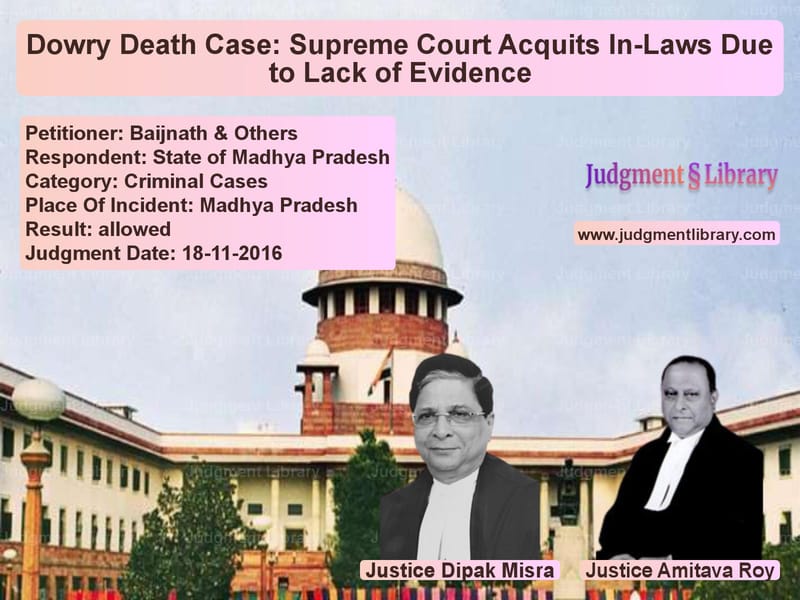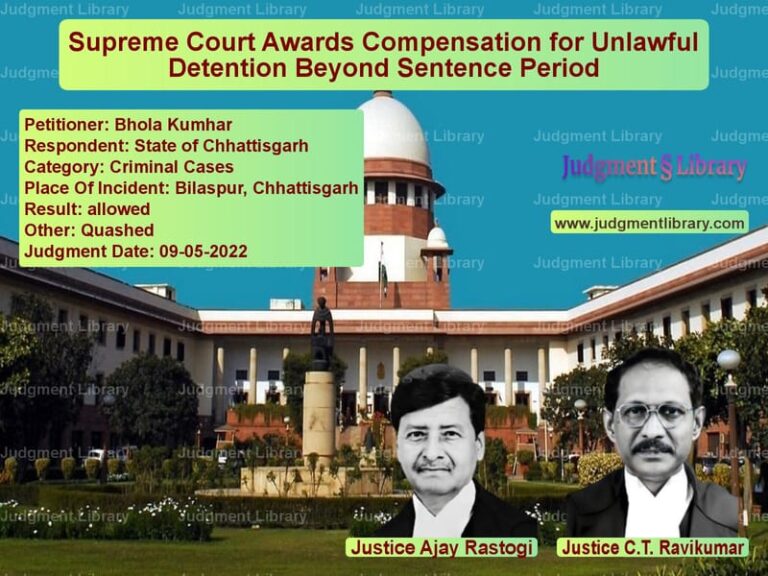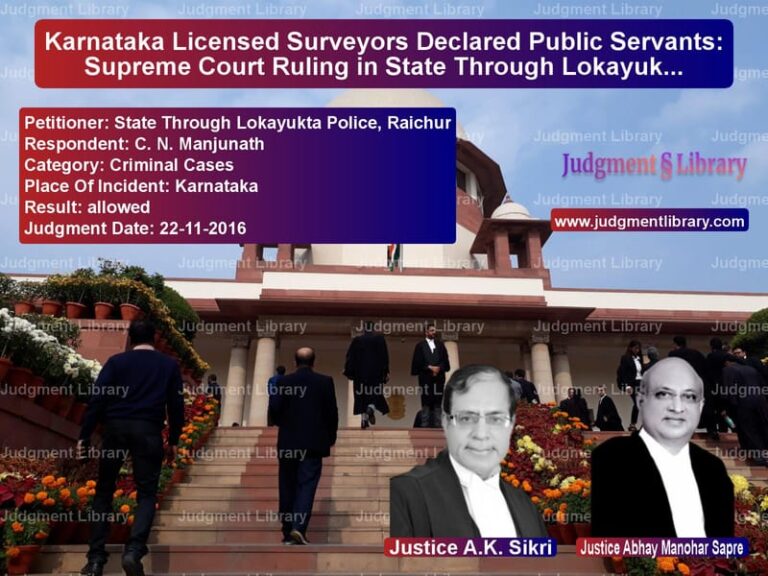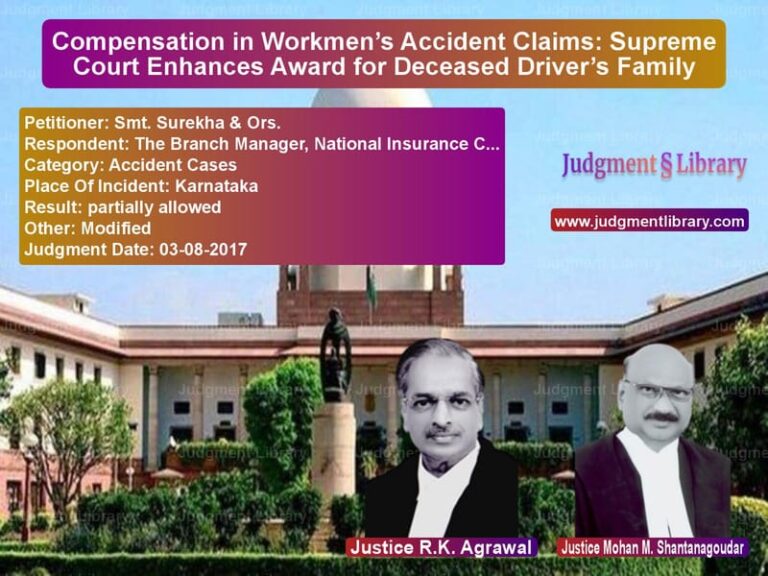Dowry Death Case: Supreme Court Acquits In-Laws Due to Lack of Evidence
The case of Baijnath & Others vs. State of Madhya Pradesh is a significant ruling by the Supreme Court of India that delves into the application of Sections 498A and 304B of the Indian Penal Code (IPC) and Section 113B of the Indian Evidence Act, 1892, concerning dowry deaths. This judgment, delivered on November 18, 2016, reversed the High Court’s decision, acquitting the accused due to insufficient evidence.
Background of the Case
The case originated from the tragic death of Saroj Bai, who was found hanging in her matrimonial home within seven years of marriage. Her husband, Rakesh, and his family members were charged under Sections 304B (Dowry Death) and 498A (Cruelty) of the IPC. According to the prosecution, the deceased was subjected to harassment and torture by her in-laws due to persistent demands for a motorcycle as dowry.
The trial court acquitted the accused, citing insufficient evidence of dowry harassment. However, the High Court overturned this acquittal and convicted the accused under Sections 498A and 304B. The in-laws, excluding the deceased’s husband (who had died by suicide during the trial), appealed the High Court’s decision before the Supreme Court.
Key Legal Issues Considered
- Did the prosecution provide sufficient evidence to prove harassment or cruelty due to dowry demands?
- Was the statutory presumption under Section 304B IPC and Section 113B of the Evidence Act correctly applied by the High Court?
- Did the High Court err in reversing the acquittal by the trial court?
Arguments Presented
Appellants (Accused In-Laws) Arguments:
- The prosecution failed to prove beyond a reasonable doubt that there was any demand for dowry.
- The evidence provided by the prosecution witnesses was inconsistent and contradictory.
- There was no credible proof that the deceased was subjected to cruelty or harassment “soon before her death,” as required under Section 304B IPC.
- The medical evidence was inconclusive regarding whether the death was a suicide or homicide.
- The High Court wrongly invoked the presumption under Section 113B of the Indian Evidence Act without fulfilling the necessary preconditions.
Respondent (State of Madhya Pradesh) Arguments:
- The deceased had died in unnatural circumstances within seven years of marriage, which warranted the presumption under Section 304B IPC.
- The prosecution witnesses, including the deceased’s parents, testified about the dowry demand and harassment.
- The High Court correctly interpreted the evidence and reversed the trial court’s acquittal.
Supreme Court’s Observations
The Supreme Court examined Sections 304B and 498A IPC alongside Section 113B of the Evidence Act, emphasizing that:
“The prosecution must establish that soon before her death, the deceased was subjected to cruelty or harassment by her husband or his relatives for, or in connection with, any demand for dowry.”
The Court highlighted that:
- The prosecution witnesses gave inconsistent testimonies about the alleged demand for a motorcycle as dowry.
- The deceased’s mother admitted that no demand for dowry was made before the marriage.
- Despite allegedly facing dowry harassment for two years, neither the deceased nor her family reported it to the police.
- Defense witnesses confirmed that the deceased’s in-laws treated her well.
- The medical evidence did not conclusively establish the cause of death.
The Court ruled that mere unnatural death within seven years of marriage does not automatically invoke the presumption of dowry death unless cruelty or harassment is proven.
Final Judgment
The Supreme Court concluded:
- The prosecution failed to establish that the deceased was harassed for dowry “soon before her death.”
- The High Court erred in applying the presumption under Section 113B of the Evidence Act.
- The trial court’s acquittal was justified and should not have been reversed.
- The accused were granted the benefit of the doubt and were acquitted.
The appeal was allowed, and the accused were ordered to be released immediately if not wanted in any other case.
Impact of the Judgment
This ruling has significant implications:
- It reinforces that mere suspicion or an unnatural death within seven years of marriage is insufficient to convict under Section 304B IPC.
- It clarifies that the presumption of dowry death requires clear proof of harassment or cruelty before death.
- It ensures that courts do not convict accused individuals solely based on assumptions without direct evidence.
- It underscores the importance of evaluating evidence meticulously to prevent wrongful convictions.
Conclusion
The Supreme Court’s judgment in Baijnath & Others vs. State of Madhya Pradesh is a landmark ruling that safeguards the rights of the accused in dowry death cases. By reaffirming the legal principles governing Section 304B IPC and Section 113B of the Evidence Act, the judgment ensures that convictions are based on substantial evidence rather than presumptions. This ruling serves as a crucial precedent in cases involving allegations of dowry harassment and unnatural deaths.
Don’t miss out on the full details! Download the complete judgment in PDF format below and gain valuable insights instantly!
Download Judgment: Baijnath & Others vs State of Madhya Prad Supreme Court of India Judgment Dated 18-11-2016.pdf
Direct Downlaod Judgment: Direct downlaod this Judgment
See all petitions in Dowry Cases
See all petitions in Domestic Violence
See all petitions in SC/ST Act Case
See all petitions in Judgment by Dipak Misra
See all petitions in Judgment by Amitava Roy
See all petitions in allowed
See all petitions in supreme court of India judgments November 2016
See all petitions in 2016 judgments
See all posts in Criminal Cases Category
See all allowed petitions in Criminal Cases Category
See all Dismissed petitions in Criminal Cases Category
See all partially allowed petitions in Criminal Cases Category







